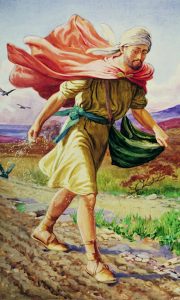Today is the 15th Sunday in Ordinary Time, Year A. The readings are good reminders of the wonders of nature to supplement our own Christian life and the wisdom of God which has been revealed to guide us. Summer gives everyone an opportunity to enjoy the heat of the sun. Though some are not used to hot weather, there are those who are farmers and backyard gardeners who love cultivating the land to produce all kinds of fruits, vegetables, and ornamental plants. I am sure they are excited to have all the bounties of the earth as they toil the land with much diligence. Two weeks ago, I planted three varieties of cherries and one apple. I like fruit bearing trees so that I can reap their fruits for me and others to enjoy.
The first reading taken from the book of Isaiah speaks about the snow and the rain that come down to water the earth; however, they remain on the soil to make it fertile and fruitful. It is the bounty of the earth that is a sign of God’s blessings. The Prophet Isaiah uses familiar agricultural images to remind the people that God is the giver of all things, and God’s work is the holiness of the people. Our fruitfulness speaks about how we remain to listen to His words and fulfill God’s will.
In the second reading from the letter of St. Paul to the Romans, Paul wants us to understand two things. First, the present time is marked by sufferings because of man’s fall into sin. Second, the future will be marked by glory for believers as God fulfills all His promises to us. Thus, by hearing God’s words, if we keep our eyes on the future promised glory, then we can endure present sufferings with perseverance and hope.
Our faith needs endurance, and therefore we should not be surprised when God sometimes takes what is perfect and subjects it to a humble status so that a greater good might be accomplished. Take hope! This stage of suffering is merely a transitional period, but somehow, through God’s amazing grace in the face of man’s awful sin, ultimately we will end with good and greater results!
The gospel from St. Matthew begins with a story of Jesus leaving a lake-side house, addressing crowds in parables from a boat. It is an inspiring story of Jesus, which narrates to His disciples about the seeds carried off by birds, scorched by the sun, choked by thorns, but then some of them take root in deep soil, yielding abundantly. It was somewhat a dramatic contrast between a series of unpromising beginnings and the abundant harvest which is hard to imagine by Jesus’ hearers.
Our simple understanding of this parable would lead us to the following reflection points:
First, this is the familiar parable of the Sower. When Jesus says, “You already know the mysteries of the kingdom of heaven; it has not yet been given to them.” Then, we have to remember that Jesus had already been talking about the scripture, or quoting the words of Isaiah, reminding them that the chosen people of Israel failed to fulfill the prophesy and its fulfillment is in those outsiders. The seed, which is the “The Word of God,” was taken for granted by those who first heard it, yet was fulfilled by “outsiders,” the Gentiles. Disgusting is the heart of these people first chosen and entrusted with the word but who have hardly heard with their ears and have closed their eyes.
Second, we are the receivers/recipients who have been prepared to cultivate and make the soil fertile. Therefore, we should also consider the role of the Sower, God, who visualizes ourselves as the ones who are inclined to take, to listen, and not to cast the seeds into the dirt. I think that the Word of God is so powerful to inspire us to share by spreading the seeds of the Gospel, and we need to share our seeds of faith with others. In addition, listening with purpose to the Word of God with an open heart, we might grow in grace and faith.
Third, for most of us, the parable was likely described by our teachers as God as the Sower and our hearts as the ground. Sometimes our hearts are open to his word, and the message of God grows in us and is apparent in our thoughts, words, and deeds. Sometimes our hearts are like the scorched earth, and the word of God does not take root and we, too, wither. Therefore, hear with our ears, and understand with our hearts and be converted, and the Word of God will heal us.
We are so blessed with our eyes because they see and our ears because they hear. I believe that we have already been given what we need for understanding, conversion, healing, and fruitful collaboration in Jesus’ mission. All we need is to wake up to fulfill the vast majority of the land on earth to be sown with His seeds of wisdom to those with a fertile heart. To share our seeds of faith is by how we live our lives, for our actions speak louder than our words. Are our daily thoughts focused on the teachings of the Gospel, or are they focused on things we can get in this world that are trivial?
“Amen, I say to you, many prophets and righteous people longed to see what you see, but did not see it, and hear what you hear, but did not hear it.” God bless you.
Fr. Arlon, osa
———————————-
El Dictado del Corazón:
Decimoquinto Domingo del Tiempo Ordinario, año, A
- Isaías 55:10-11
- Salmo 65:10, 11, 12-13, 14
- Romanos 8:18-23
- Mateo 13:1-23 o 13:1-9
Hoy es el Decimoquinto Domingo del Tiempo Ordinario, Año A. Las lecturas nos recuerdan las maravillas de la naturaleza, para complementar nuestra propia vida cristiana y la sabiduría de Dios, que ha sido revelada para guiarnos. El verano nos permite disfrutar del calor del sol. Aunque algunos no estemos acostumbrados al clima cálido, algunos son agricultores y jardineros a los que les encanta cultivar la tierra para producir todo tipo de frutas, verduras y plantas ornamentales. Ellos están emocionados de tener todas las bondades de Dios, mientras trabajan la tierra con mucha diligencia. Hace dos semanas planté tres variedades de cerezos y un árbol de manzana. Me gustan los árboles frutales para poder cosechar sus frutos para que yo y los demás disfrutemos.
La primera lectura, tomada del libro de Isaías, habla de la nieve y la lluvia que descienden para regar la tierra; sin embargo, permanecen en el suelo para hacerlo fértil y fructífero. Es la generosidad de la tierra que es un signo de las bendiciones de Dios. El profeta Isaías usa imágenes agrícolas familiares para recordarle al pueblo que Dios es el dador de todas las cosas, y que la obra de Dios es la santidad del pueblo. Nuestra fecundidad habla de cómo permanecemos para escuchar sus palabras y cumplir la voluntad de Dios.
En la segunda lectura de la carta de San Pablo a los Romanos, Pablo quiere que entendamos dos cosas. Primero, el tiempo presente está marcado por el sufrimiento a causa de la caída del hombre en el pecado. En segundo lugar, el futuro estará marcado por la gloria de los creyentes a medida que Dios cumpla todas sus promesas para con nosotros. Así, al escuchar las palabras de Dios, si mantenemos los ojos en la gloria futura prometida, entonces podemos soportar los sufrimientos presentes con perseverancia y esperanza.
Nuestra fe necesita perseverancia y, por lo tanto, no debemos sorprendernos cuando Dios a veces toma lo que es perfecto y lo somete a un estado humilde para que se pueda lograr un bien mayor. ¡Ten esperanza! Esta etapa de sufrimiento es simplemente un período de transición, pero de alguna manera, a través de la asombrosa gracia de Dios frente al terrible pecado del hombre, ¡finalmente terminaremos con buenos y mejores resultados!
El evangelio de San Mateo comienza con una historia de Jesús saliendo de una casa junto al lago, dirigiéndose a la multitud en parábolas desde un bote. Es una historia inspiradora de Jesús, que narra a sus discípulos acerca de las semillas arrebatadas por las aves, quemadas por el sol y ahogadas por las espinas, pero luego algunas de ellas echan raíces en tierra profunda, dando abundantemente. Fue algo así como un contraste dramático entre una serie de comienzos poco prometedores y la abundante cosecha que es difícil de imaginar para los oyentes de Jesús.
Nuestra simple comprensión de esta parábola nos llevaría a los siguientes puntos de reflexión:
Primero, esta es una parábola familiar del sembrador. Cuando Jesús dice: “Vosotros ya conocéis los misterios del reino de los cielos; aún no se les ha dado.” Entonces, hay que recordar que Jesús ya venía hablando de la escritura, o citando las palabras de Isaías, recordándoles que el pueblo escogido de Israel no cumplió la profecía y su cumplimiento está en esos de afuera. La simiente, que es “La Palabra de Dios”, fue dada por sentada por los primeros que la oyeron, pero fue cumplida por los “foráneos”, los gentiles. Asqueroso es el corazón de este pueblo primero escogido y encargado de la palabra pero que apenas han oído con los oídos y han cerrado los ojos.
Segundo, somos los receptores/destinatarios que han sido preparados para cultivar y hacer fértil el suelo. Por lo tanto, también debemos considerar el papel del Sembrador, Dios, que nos visualiza como aquellos que están dispuestos a tomar, a escuchar y no a tirar las semillas en la tierra. Creo que la Palabra de Dios es tan poderosa para inspirarnos a compartir esparciendo las semillas del Evangelio, y necesitamos compartir nuestras semillas de fe con los demás. Además, al escuchar con propósito la Palabra de Dios con un corazón abierto, podemos crecer en gracia y fe.
Tercero, para la mayoría de nosotros, nuestros maestros probablemente describieron la parábola como Dios como el sembrador y nuestros corazones como la tierra. A veces, nuestro corazón está abierto a su palabra, y el mensaje de Dios crece en nosotros y se manifiesta en nuestros pensamientos, palabras y obras. A veces nuestro corazón es como la tierra arrasada, y la palabra de Dios no echa raíces y nosotros también nos marchitamos. Por tanto, oíd con nuestros oídos, entended con nuestro corazón, y convertíos, y la Palabra de Dios nos sanará.
Somos tan bendecidos con nuestros ojos porque ven y nuestros oídos porque oyen. Creo que ya se nos ha dado lo que necesitamos para la comprensión, la conversión, la sanación y la colaboración fructífera en la misión de Jesús. Todo lo que necesitamos es despertar para llenar la gran mayoría de la tierra en la tierra para sembrar con Sus semillas de sabiduría a aquellos con un corazón fértil. Compartir nuestras semillas de fe es por cómo vivimos nuestras vidas, porque nuestras acciones hablan más que nuestras palabras. ¿Están nuestros pensamientos diarios enfocados en las enseñanzas del Evangelio, ¿O se centran en cosas que podemos obtener en este mundo que son triviales?
“En verdad os digo que muchos profetas y justos desearon ver lo que vosotros veis, pero no lo vieron, y oyeron lo que vosotros oís, pero no lo oyeron”. Dios lo bendiga.
Padre Arlón, osa

